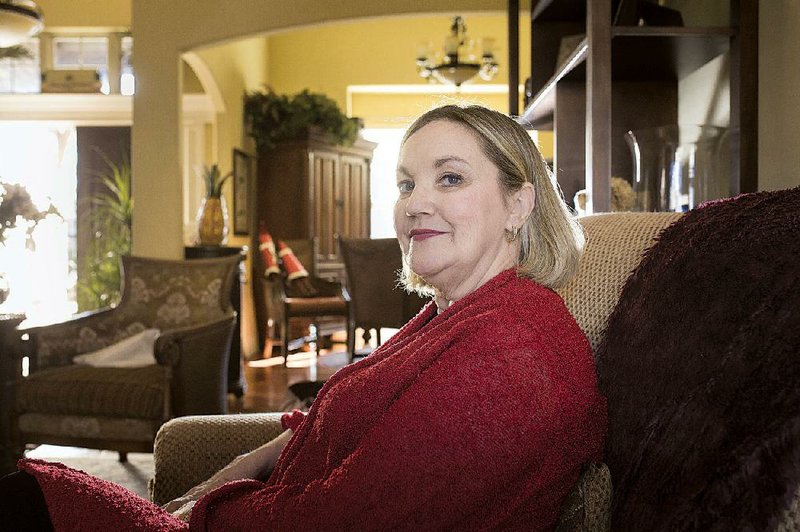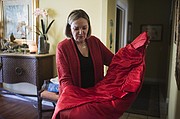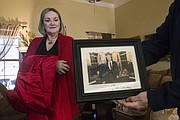When Ruth Coker Burks visits Files Cemetery, situated on one of the hills around Hot Springs, she thinks back 50 years to the day her mother told her of an inheritance she would one day receive.
It was not the inheritance of 10-year-old girls' dreams.
Not money or jewelry -- it would be 262 plots her mother had bought in Files Cemetery, the legacy of a family feud.
It was the late 1960s. Burks saw no immediate need for the cemetery and went on with her life. She got married and divorced and was raising a daughter while working as a real estate agent.
Files would sit mostly unused for more than a decade -- until a chance encounter in the 1980s would change her life and those of hundreds of people with a devastating new disease called AIDS.
Over the next decade, until advances in medical care and changes in attitudes made her work obsolete, Burks took it as her calling to become a caregiver and confidante for people with AIDS who had been abandoned by their families and most of society. She would care for them until they died, then bury dozens in her cemetery when no one claimed their bodies.
Burks would be vilified by some for her work. Early on, AIDS was a frightening disease, evoking fear and prejudice. But others helped her -- a loose alliance of female impersonators who held fundraisers to, eventually, a few influential people in town whose work was done clandestinely.
Now 60 years old and retired in Northwest Arkansas, Burks is now the one needing help.
It comes back to that cemetery.
FAMILY PLOTS
The genesis for ownership of Files Cemetery began when Burks' mother, Aleene Coker, felt her oldest brother had mistreated their mother. Her revenge was to buy the remaining plots available in the cemetery so the uncle and his kin would never be buried with her part of the family.
Southerners traditionally go to cemeteries on Sundays to tend to the graves, and Aleene was no exception. Four generations of the family were buried there. One day, Burks recalled, her mother remarked sarcastically, "Someday all this is going to be yours."
"I thought I would get a watch or a ring" as an inheritance. "What am I going to do with a cemetery? I'm 10 years old. I'm an only child."
Fifteen years would pass, with the cemetery plots largely unused. Until the AIDS crisis hit Arkansas.
What would become Burks' calling began unexpectedly on a day in 1984 in a wing of an Arkansas hospital, when she met her first AIDS patient.
She was 25 years old and had been sitting with a friend, Bonnie, who had cancer. Burks had noticed the door to a patient's room with warning signs on it and trays of uneaten food sitting outside. No one seemed to go in there. Either through curiosity or a "higher calling" -- she's not sure which -- Burks sneaked into the room.
Inside was a young man named Jimmy, from Little Rock. He'd wasted away to less than 100 pounds. The look on his face told her death was not far away.
"You couldn't tell him from the sheets, he was so thin and pale," she says.
She knew little about AIDS at the time but knew "instinctively" what it was. She took the dying man's hand and asked him if there was anything she could do for him. He told her he wanted to see his mother before he died.
"I said to myself, 'I can get that done and get back to Bonnie, and I've done my good deed,'" Burks says. She went to the nurses station to deliver the request.
It would also be the first day she saw the fear and prejudice surrounding AIDS.
"They said, 'Honey, his mama's not coming; nobody's coming. He's been here six weeks,'" Burks says. "That told me he'd had six weeks being treated like garbage and being ignored."
The nurses were incredulous she had gone in the room, but one slid her the mother's phone number. Burks called.
His mother wasn't coming.
"She said her son died years ago. He was a sinner, and he was going to hell, and basically, don't call her back," Burks says. "She didn't want to know when he died. I can't imagine how she lives with that."
Burks says she returned to Jimmy's room, pondering what to tell the dying man.
"He tried to cry but he couldn't. He didn't have any tears left. He said, 'Oh, mama, I knew you would come,'" Burks says. "I said to myself, 'What am I going to do now?' I took his hand and said, 'I'm here.'"
She'd eventually go back to Bonnie's room to tell her friend of the predicament.
"She said, 'Go back to him. He needs you. I don't need you right now.'"
Burks says she sat with Jimmy for the next 13 hours, reading to him, singing and telling him about her cemetery before he died.
Burks says she found a funeral home willing to do the cremation and paid for it. A chipped cookie jar donated by a potter would become a burial urn.
She had a need for her cemetery.
Burks says she couldn't find a minister willing to perform a graveside service, so she and her 2-year-old daughter held a "do-it-yourself" funeral -- digging a hole for the urn on top of her father's grave. A short prayer and it was over. There would be no grave marker.
"I thought Jimmy would be the only one I would ever meet in my whole life," she says. "I had no idea it would get this big."
But it did. Word started getting around Arkansas that a woman in Hot Springs with no medical training was willing to help people with AIDS, regardless of the stigma. She became what she and supporters describe as a one-person support cell for men and a handful of women -- driving them to doctors' appointments, scrounging up money for rent, helping to find doctors and drugs, collecting food and getting information from the dying that would be needed for their death certificates.
Word also got around Arkansas about this "this crazy woman in Hot Springs," Burks says.
CEMETERY ANGEL
In the early years of the epidemic, public perception of AIDS, its causes and contagion was wrapped in prejudice, apprehension and misinformation. Burks' work ran headlong into that.
"Their families and the churches didn't want them; their friends and partners have died, and now they have it," Burks says. "Their only option was to come back home to a family, church and a state that didn't want them in the first place."
Early on, some people in Hot Springs knew what she was doing, Burks says, but she was discreet. She was a divorcee with a young child.
"I was doing it without any help for a couple of years," she says. "I didn't want anyone knowing what I was doing until after my daughter's daddy died in an automobile accident (in 1988) because there wasn't a judge alive who wouldn't have taken my daughter away from me."
Burks describes herself as ostracized by many as she advocated for those with the disease: Disinfectants sprayed on chairs where she'd sat, pharmacy workers who refused to touch her pen after she signed for prescriptions and whispers of sexual promiscuity.
"They called me 'the AIDS woman.' I was a pariah," she says. "People thought I brought AIDS to Hot Springs. I didn't."
As a member of her church's finance committee, she says she once asked the minister for a room at the church to conduct monthly AIDS support group meetings.
"He said, 'Surely, you aren't talking about bringing those people into this church?'" Burks says. "I told him, 'No, I'm talking about walking those people across your $30,000 lawn, into your $300,000 house and sitting their asses on the furniture this church bought you.'"
She was removed from the finance committee, Burks says. She stayed in the church and kept her faith -- although "I questioned everyone else's."
As attitudes about AIDS began to change, she also got clandestine help, Burks says. A banker who knew a dying man's parents donated a mercy flight to return him to Hot Springs. Supermarket workers left food that had reached its expiration date but was still edible. Shunned by many in her church, other parishioners were among those who gave money, she says.
"But it was all quiet. If it hadn't been for them, I don't know what I would have done. But the rest of them wanted me out."
Drag shows at gay clubs around the state were an indispensable source of money, Burks says.
THE RED DRESS
The AIDS patient who hit her hardest, she says, was Billy, a 20-something-year-old from Hot Springs. She knew him the longest, from before he was diagnosed with AIDS until he died. Billy was among the performers in some of the drag shows. She accompanied him to the doctor the day he was diagnosed with AIDS and also to a department store the day he turned in notice he couldn't keep working. Before he died, he gave Burks a red dress in which he performed.
Another man sold her one of his dresses, which she wore to the first inauguration of President Bill Clinton, a friend from childhood.
A man named Felton was a state employee. Like many, he needed Burks to talk him through his despair.
"A lot of them asked if they had done something wrong and if this was God's punishment," she says. "I told them, 'No, this is a virus.' I gave them comfort and assurance. They died having made peace with God."
Joe Ross' grave is among less than half a dozen marked graves at Files Cemetery, and it is the only one regularly tended to, the work of his older sister and her daughter.
As AIDS took the life of Ross, it fell to that sister, Janie Neuwirth, to begin making arrangements for after his death. Money was tight and her parents were too distraught to deal with the situation. When she went to a convent to ask for help, a nun gave her Burks' name.
Burks, who unbeknownst to Neuwirth had been helping Ross, told her to pick out a cemetery plot and she would handle the rest.
"I was close to a nervous breakdown. This woman saved me," Neuwirth says. "Who would sit with someone with 'gay cancer', which was what it was called at the time. Nobody wanted them.
"I thought she should be nominated to be a legal saint. She was certainly a saint in my eyes. "
Jamie Morris, who died of AIDS in 2003, was not like many of the men Burks helped. He had a network of friends and family who cared for him.
Morris' mother, Nancy Cook, lives in Louisiana and doesn't know Burks. But she knows about the toll on a caretaker.
"She basically came in and parented these kids," Cook says. "I don't know how she found the energy to do it. It takes every ounce of energy you have to help someone die. She did it over and over again."
PROTECTING HER HEART
Burks is uncertain of the exact number of people she buried in her cemetery but believes it's 43. Others had their ashes scattered by family members. She estimates "hands-on" assistance for 100 people, plus hundreds more through support groups.
Time has taken a toll on her recollection of exact numbers -- perhaps, she says, a blessing.
"I wrestled then and now with the enormity of the fact that I was burying men I would never know," she says. "My mind can't fathom how many men were lost, and maybe it's to protect my heart."
One number she is certain of is how many ministers performed graveside services for her: Zero. She says she did all funerals herself after being refused one too many times.
Time has faded some of the emotions toward individuals who criticized her cause. But she holds nothing back when it comes to many churches and the federal government's initial response to AIDS.
"When they got sick, churches would say, 'This is God's punishment for what they did,'" she says. "No one did anything wrong; it was a virus. Too many (with AIDS) knew they couldn't come home to their families because if you come home you will bring that plague back to us. The churches kept that fear ginned up."
Burks says she never worried she might get sick but smiles now at the memory of the time she woke up with the night sweats. It turned out her cat had hit the "on" button of the electric blanket.
Advances in treatment and understanding of AIDS made her work "functionally obsolete" by the late 1990s, she says.
"People weren't dying of AIDS. They were living with it," she says.
Burks moved to Florida to get away, working at a funeral home and as a fishing guide. She had a stroke in 2010, which she attributes in part to the stresses of her past life. She had to relearn how to walk, talk and feed herself. The cadence of Randy Travis songs helped with her therapy.
She then returned to Arkansas, first to her hometown of Hot Springs and to Lake Hamilton, for years her place of comfort.
Burks has since moved to a quiet neighborhood in Rogers, to be near her daughter and three grandchildren. Few of her neighbors know about her work, she says.
Four hours away, meanwhile, Files Cemetery, with its graves dating to the mid-1800s, is showing its age. There are few fresh flowers and it needs a good cleanup.
All but a handful of the graves of those who died of AIDS are unmarked and time has faded most of the temporary markers. The rocky ground next to a Coker family memorial marker is dotted with a rainbow wreath and 20 groupings of artificial flowers.
To beautify the cemetery, Burks has tried to plant perennial flowers she has scavenged -- with mixed success. A group of female impersonators have had better luck with rose bushes that line the fence.
Burks is approaching the autumn of her life and needs to find someone to care for her cemetery. Because it has become a pilgrimage site for some, she plans a memorial garden with a Weeping Angel monument and envisions perennial flowers. She wants to be buried there.
Burks, who has written her memoirs and sold movie rights to her story, says she has no regrets about the path she chose. The ostracism hurt, she says, and she had hoped to remarry and have more children. But at the crossroads, she chose a different direction in life.
"I'm just a regular person," she added, downplaying suggestions about her mettle. "Word got out that there's this crazy woman who's not afraid. Maybe I was, but everybody's got to have something. All I did was what anyone should have done, but they didn't."
SELF PORTRAIT
Ruth Coker Burks
• DATE AND PLACE OF BIRTH: March 19, 1959, Hot Springs
• MY FAVORITE PET: Louie, my cat.
• MY PET PEEVE: I cannot stand bullies.
• I LISTEN TO: National Public Radio.
• MY FAVORITE MOVIE: Apollo 13.
• MY FAVORITE TV SHOW: Anything about the news and weather.
• WHAT DO I DO TO RELAX: Hanging out at the river with my grandchildren.
• WHAT I WANT TO BE REMEMBERED FOR: Caring for people with AIDS when nobody else would, and also that they entrusted me with their stories.
• MY BEST CHARACTER ASSET: God put blinders on me so I don't see danger.
• MY BIGGEST CHARACTER FLAW: God put blinders on me so I don't see danger. I've been hurt doing the right thing, but as I have gotten older I have made peace with that.
• WHAT BOTHERS ME THE MOST: Hypocrisy. God calls us to love people. It is very easy to do the right thing; it might be harder to deal with the consequences of that decision, but it is always worth it.
• THE ONE WORD TO SUM ME UP: Present
High Profile on 02/02/2020


